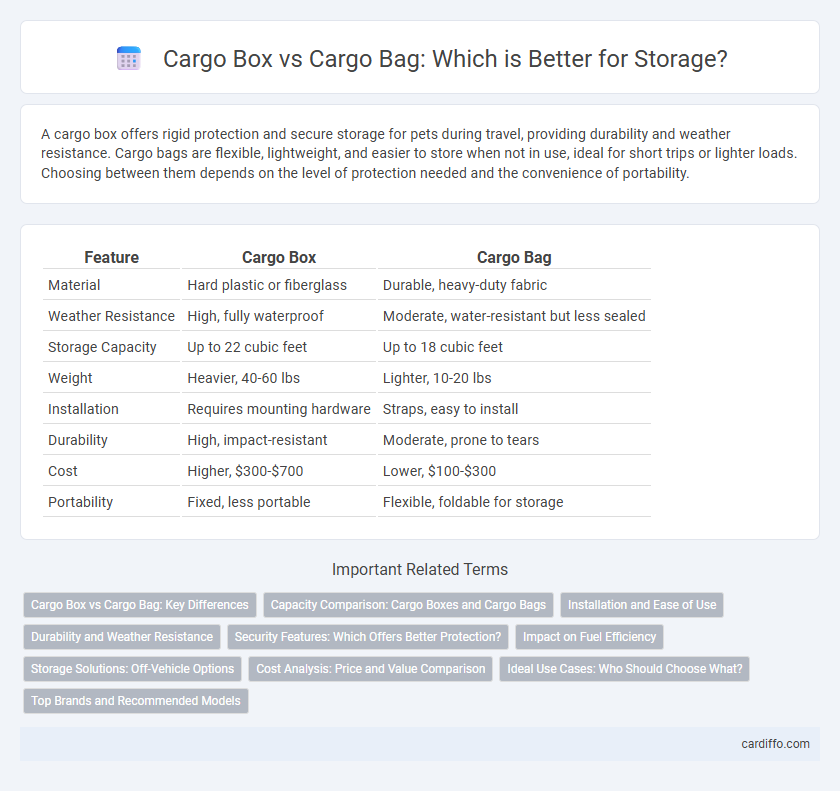A cargo box offers rigid protection and secure storage for pets during travel, providing durability and weather resistance. Cargo bags are flexible, lightweight, and easier to store when not in use, ideal for short trips or lighter loads. Choosing between them depends on the level of protection needed and the convenience of portability.
Table of Comparison
| Feature | Cargo Box | Cargo Bag |
|---|---|---|
| Material | Hard plastic or fiberglass | Durable, heavy-duty fabric |
| Weather Resistance | High, fully waterproof | Moderate, water-resistant but less sealed |
| Storage Capacity | Up to 22 cubic feet | Up to 18 cubic feet |
| Weight | Heavier, 40-60 lbs | Lighter, 10-20 lbs |
| Installation | Requires mounting hardware | Straps, easy to install |
| Durability | High, impact-resistant | Moderate, prone to tears |
| Cost | Higher, $300-$700 | Lower, $100-$300 |
| Portability | Fixed, less portable | Flexible, foldable for storage |
Cargo Box vs Cargo Bag: Key Differences
Cargo boxes offer rigid, weatherproof storage with enhanced security, making them ideal for long-term use and heavy-duty applications. Cargo bags provide flexible, lightweight storage that can be easily folded and stored when not in use, suited for temporary or irregularly shaped items. Key differences include durability, protection against elements, storage capacity, and ease of transport.
Capacity Comparison: Cargo Boxes and Cargo Bags
Cargo boxes typically offer a rigid structure with a fixed capacity ranging from 10 to 22 cubic feet, providing organized and secure storage ideal for heavy or fragile items. Cargo bags, constructed from flexible materials, can expand or compress to accommodate varying loads, often holding between 15 to 25 cubic feet but with less protection against weather and impact. Choosing between cargo boxes and cargo bags depends on the specific storage needs, such as volume flexibility and durability requirements during transport.
Installation and Ease of Use
Cargo boxes offer a more secure installation with hard mounting systems that require tools and professional setup, ensuring stability for long trips. Cargo bags provide a flexible, tool-free installation with adjustable straps, allowing quick attachment and removal on various vehicle roofs. The choice between the two depends on whether ease of use or long-term durability is prioritized.
Durability and Weather Resistance
Cargo boxes provide superior durability and weather resistance due to their hard-shell construction, typically made from impact-resistant materials such as ABS or polycarbonate. They offer better protection against rain, snow, and UV rays, ensuring stored items remain dry and secure in harsh conditions. Cargo bags, usually made from heavy-duty nylon or polyester, are more flexible and lightweight but generally less resistant to extreme weather and physical impacts compared to cargo boxes.
Security Features: Which Offers Better Protection?
Cargo boxes offer superior security features compared to cargo bags, featuring hard-shell construction resistant to impact and theft, often equipped with lockable latches or built-in locking mechanisms. In contrast, cargo bags, made from durable fabric materials with zippers, are more vulnerable to cuts or tampering, providing less deterrence against theft. For maximum protection of valuable items during transport, cargo boxes are the preferred choice due to their enhanced structural integrity and secure locking options.
Impact on Fuel Efficiency
Cargo boxes, typically made from hard plastic or fiberglass, create more aerodynamic drag compared to cargo bags, which are flexible and conform to the vehicle's shape, resulting in higher fuel consumption. The increased wind resistance from cargo boxes can reduce fuel efficiency by up to 10-15% on highways, while cargo bags usually cause a minimal impact, often less than 5%. Choosing a low-profile cargo box or a well-fitted cargo bag can significantly optimize fuel economy during transportation.
Storage Solutions: Off-Vehicle Options
Cargo boxes offer durable, weather-resistant storage solutions with rigid construction, ideal for protecting fragile items during transport. Cargo bags provide flexible, lightweight alternatives that can be compressed for easy storage when not in use, making them suitable for varied cargo sizes. Both off-vehicle storage options maximize space efficiency, with cargo boxes typically offering lockable security and cargo bags supporting versatile packing needs.
Cost Analysis: Price and Value Comparison
Cargo boxes generally have a higher upfront cost, ranging from $200 to $700 depending on size and material, offering greater durability and weather resistance, which justifies their price for frequent users. Cargo bags are more budget-friendly, often priced between $50 and $150, providing flexible storage but with reduced protection against elements and lower long-term durability. The value comparison favors cargo boxes for those seeking longevity and secure storage, while cargo bags are ideal for occasional use with minimal investment.
Ideal Use Cases: Who Should Choose What?
Cargo boxes provide rigid protection and increased security, making them ideal for long road trips and harsh weather conditions where durability is essential. Cargo bags offer flexible storage and lightweight convenience, perfect for occasional use or irregularly shaped items that require easy packing and unpacking. Outdoor enthusiasts and families prioritizing maximum protection benefit from cargo boxes, while casual travelers and those valuing portability prefer cargo bags.
Top Brands and Recommended Models
Top brands in cargo storage include Thule, Yakima, and Curt, known for durable cargo boxes like the Thule Motion XT and Yakima SkyBox 16 Carbonite. Recommended cargo bags such as the Everest Cargo Bag and Rightline Gear Raw Power offer lightweight, flexible alternatives ideal for variability and ease of storage. These models excel in weather resistance, capacity, and ease of installation, meeting diverse needs for road trips and outdoor adventures.
cargo box vs cargo bag Infographic

 cardiffo.com
cardiffo.com